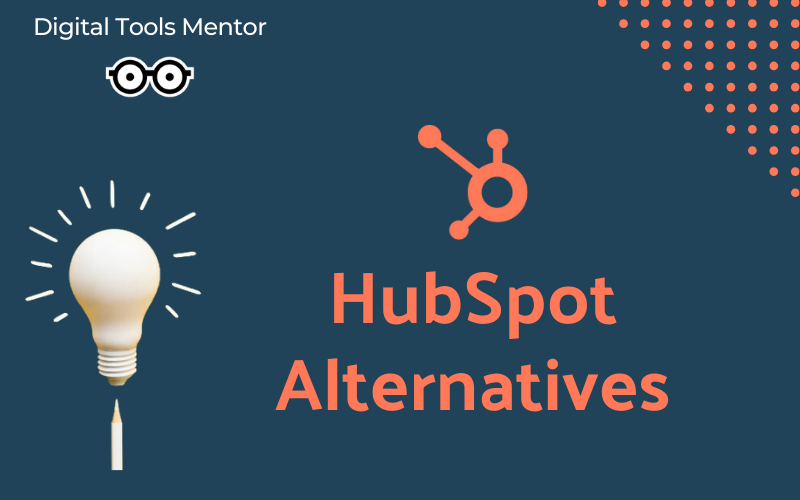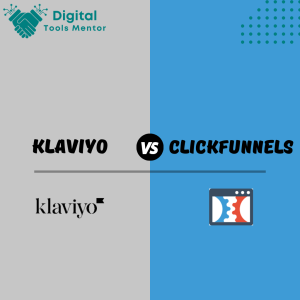13 Best HubSpot Alternatives in 2023 (Free & Paid)
In today’s fast-paced business world, Customer Relationship Management (CRM) and inbound marketing have become essential tools for companies aiming to thrive and maintain competitive edges. CRM systems are vital in managing customer data, enhancing customer experiences, and driving sales, while inbound marketing plays a crucial role in attracting and engaging customers through relevant content creation and distribution. In this landscape, HubSpot has emerged as a frontrunner, offering an all-in-one platform that combines CRM, marketing, sales, and service functionalities.
However, every business is unique, and what works for one may not suit another. This is where the need for alternatives arises. Whether it’s due to budget constraints, the desire for simpler or more complex features, or the need for a different approach to customer engagement, there are several reasons why companies might look beyond HubSpot.
In this blog post, we delve into the “13 Best HubSpot Alternatives in 2023,” encompassing both free and paid options. Our goal is to provide you with a comprehensive guide that caters to a variety of business needs, sizes, and budgetary considerations. We’ll explore each alternative, shedding light on their unique features, benefits, and how they stack up against HubSpot. By the end of this post, you’ll have a clear understanding of the available options, empowering you to make an informed decision that best aligns with your business objectives. So, let’s dive into the world of CRM and inbound marketing solutions to discover the tools that will help drive your business forward in 2023.
List of 13 Best HubSpot Alternatives
1. MailerLite -User-friendly alternative for small to medium-sized businesses
2. EmailOctopus – Cost-effective and scalable
3. Brevo – Unique blend of marketing automation and personalization
4. Moosend – ideal for businesses of all sizes
5. Zoho Campaigns – Integrates seamlessly with the Zoho ecosystem
6. Omnisend – Perfect for e-commerce businesses
7. GetResponse – Versatile all-in-one Marketing solution
8. Flodesk – Combines style with functionality
9. Clickfunnel – Comprehensive funnel-building platform
10. EngageBay – An affordable all-in-one marketing, sales, and service CRM solution
11. Active Campaign – Suitable for businesses focusing on customer experience
12. Emercury – Offering unique solutions for subscriber engagement
13. Saleshandy -Perfect for sales-driven organizations
1. MailerLite
MailerLite stands out for its simplicity and ease of use, making it ideal for small to medium-sized businesses looking for an efficient, no-frills email marketing solution. It focuses on essential features like email automation, landing pages, and survey tools without overwhelming users.
MailerLite Key Features
- Intuitive drag-and-drop editor
- Advanced segmentation and personalization
- Built-in photo editing and file manager
MailerLite Pricing
Free tier up to 1,000 subscribers; Paid plans start at $10/month.
2. EmailOctopus
EmailOctopus is known for its affordability and scalability. It’s an excellent option for startups and small businesses looking for a reliable, cost-effective email marketing tool that scales with their growth.
EmailOctopus Key Features
- Amazon SES integration for high deliverability
- Customizable templates
- Detailed campaign analytics
EmailOctopus Pricing
Free tier up to 2,500 subscribers; Paid plans start at $20/month.
3. Brevo
Brevo differentiates itself with a strong focus on personalized marketing automation. It’s designed for businesses that want to enhance their customer engagement with more targeted and customized communication strategies.
Brevo Key Features
- Personalized marketing automation
- Rich customer insights
- Integration-friendly platform
Brevo Pricing
Custom pricing based on business needs.
4. Moosend
Moosend is a versatile email marketing platform that offers robust automation features wrapped in a user-friendly interface. It’s suitable for businesses of any size looking to streamline their marketing efforts with automation.
Moosend Key Features
- Advanced list segmentation
- Drag-and-drop email editor
- Detailed performance reporting
Moosend Pricing
Free tier up to 1,000 subscribers; Paid plans start at $8/month.
5. Zoho Campaigns
Zoho Campaigns is part of the extensive Zoho suite, offering seamless integration with other Zoho products. It’s ideal for businesses already using Zoho applications and looking for a CRM-centric email marketing platform.
Zoho Campaigns Key Features
- Integration with Zoho CRM and other Zoho apps
- Automated workflows
- Pre-designed templates and A/B testing
Zoho Campaigns Pricing
Free tier up to 2,000 subscribers; Paid plans start at $3/month.
6. Omnisend
Omnisend is tailored for e-commerce businesses, offering advanced features like multi-channel marketing automation which allows integration of email, SMS, and social media channels for a cohesive marketing strategy.
Omnisend Key Features
- Multi-channel marketing automation
- Advanced segmentation
- E-commerce integrations
Omnisend Pricing
Free tier available; Paid plans start at $16/month.
7. GetResponse
GetResponse is an all-in-one marketing platform that offers a range of tools from email marketing to landing pages, webinars, and CRM. It’s suitable for businesses looking for a comprehensive solution for various marketing needs.
GetResponse Key Features
- Autoresponders and advanced segmentation
- Landing pages and conversion funnels
- Webinar hosting capabilities
GetResponse Pricing
No free tier; Paid plans start at $15/month.
8. Flodesk
Flodesk is known for its visually appealing templates, making it a favorite among businesses that prioritize brand aesthetics. It’s perfect for those who want beautiful, easy-to-design emails without compromising on functionality.
Flodesk Key Features
- Beautiful, customizable templates
- Unlimited emails and subscribers on all plans
- Easy integration with other tools
Flodesk Pricing
No free tier; Flat rate of $38/month.
9. ClickFunnels
ClickFunnels is more than an email marketing tool; it’s a comprehensive funnel-building platform designed for businesses focused on aggressive marketing and sales strategies. It’s suitable for those who want to create seamless sales funnels that convert.
ClickFunnels Key Features
- Drag-and-drop funnel builder
- A/B testing and analytics
- Membership site functionality
ClickFunnels Pricing
No free tier; Plans start at $97/month.
10. EngageBay
EngageBay is an all-in-one CRM solution that combines marketing, sales, and service automation at an affordable price, making it a great choice for small businesses looking for a comprehensive platform.
EngageBay Key Features
- Marketing automation and email marketing
- CRM and sales bay
- Service bay with ticketing and live chat
EngageBay Pricing
Free tier available; Paid plans start at $8.99/month.
11. ActiveCampaign
ActiveCampaign is known for its advanced email automation and CRM capabilities, making it ideal for businesses that focus heavily on customer experience and engagement.
ActiveCampaign Key Features
- Advanced email automation and tagging
- Integrated CRM system
- Site and event tracking
ActiveCampaign Pricing
No free tier; Plans start at $9/month.
12. Emercury
Emercury stands out with its focus on personalized email marketing. It’s designed for businesses that prioritize subscriber engagement through tailor-made messages and campaigns.
Emercury Key Features
- Personalization and segmentation
- Automated behavioral triggers
- Detailed analytics and reporting
Emercury Pricing
Free tier up to 1,000 subscribers; Paid plans available upon request.
13. Saleshandy
Saleshandy is tailored for sales teams, focusing on email outreach and follow-up. It’s the go-to platform for businesses that want to streamline their sales processes with effective email tracking and automation features.
Saleshandy Key Features
- Email tracking and scheduling
- Automated follow-ups
- Document tracking
Saleshandy Pricing
Free tier available; Paid plans start at $9/user/month.
5 Reasons Why Switch To A HubSpot Alternative?
Switching to a HubSpot alternative can be a strategic move for many businesses, driven by various factors. Here are five compelling reasons why companies might consider exploring alternatives:
1. Cost-Effectiveness
HubSpot, known for its comprehensive features, can be a significant investment, especially for small businesses or startups. Alternatives often offer more flexible pricing structures, including free tiers and lower-cost plans, making them a financially viable option for companies with tighter budgets or those not requiring the full suite of features HubSpot offers.
2. Scalability Concerns
While HubSpot is scalable, some businesses might find its scalability options either too complex or not aligned with their growth trajectory. Alternatives may offer more tailored scalability options, ensuring that businesses pay for only what they need and can easily adjust as they grow.
3. Simpler, More Intuitive Platforms
For some companies, especially those with limited technical expertise, HubSpot’s wide array of features can be overwhelming. Businesses might seek alternatives that offer a more user-friendly, straightforward platform, making it easier for their team to manage their marketing, sales, and service efforts without a steep learning curve.
4. Desire for a Different Feature Mix
HubSpot offers an extensive range of features, but some businesses might require specific functionalities that are either not available or not as developed in HubSpot. Alternatives might provide a better fit in terms of the feature mix, focusing on particular aspects like advanced email marketing automation, more robust CRM capabilities, or specialized e-commerce integrations.
5. Alignment with Specific Business Needs
Every business has unique requirements, and a one-size-fits-all solution like HubSpot might not be the perfect fit for every company. Alternatives can offer solutions that align more closely with specific business needs, whether that’s a focus on B2B interactions, niche market segments, or particular types of customer engagement strategies.
3 Key Advantages of Switching To HubSpot Alternatives
Switching to a HubSpot alternative can bring several key advantages to businesses, especially those looking for solutions that better align with their specific needs and constraints. Here are three key advantages of considering HubSpot alternatives:
1. Cost Savings and Flexible Pricing
One of the most significant advantages of switching to a HubSpot alternative is the potential for cost savings. Many alternatives offer more affordable pricing plans, including free tiers and lower-cost subscriptions, which can be particularly appealing for small businesses, startups, or any organization with a limited budget for digital marketing tools. These alternatives often provide flexible pricing structures, allowing businesses to pay only for the features they need without the financial burden of a comprehensive but costly platform.
2. Tailored Feature Sets for Specific Needs
Different businesses have different needs, and a one-size-fits-all solution may not address every company’s unique requirements. HubSpot alternatives often cater to a variety of niche markets or specific business functions. For instance, some platforms might focus more intensely on advanced email marketing capabilities, better e-commerce integrations, or specialized CRM features. This allows businesses to choose a platform that aligns more closely with their specific operational focus, be it B2B sales, online retail, or customer service enhancement.
3. Simplicity and Ease of Use
Another key advantage of many HubSpot alternatives is their simplicity and user-friendliness. While HubSpot offers a wide range of features, its comprehensive nature can sometimes be overwhelming, particularly for smaller teams or those without dedicated IT support. Alternatives often boast more intuitive interfaces and streamlined functionalities, making it easier for teams to adopt and efficiently use the platform. This simplicity can lead to better employee engagement with the tool, quicker implementation times, and reduced training requirements, ultimately enhancing productivity and effectiveness in marketing and sales efforts.
7 Key Features To Evaluate in HubSpot Alternatives?
When searching for a HubSpot alternative, it’s crucial to consider certain key features that can significantly impact the effectiveness and efficiency of your marketing, sales, and customer service efforts. Here are seven essential features to look for:
1. Marketing Automation
This is a cornerstone feature for any digital marketing platform. Look for alternatives that offer robust automation tools, allowing for the creation of efficient email campaigns, social media posts, and other marketing activities. The automation should be intuitive and customizable to cater to specific audience segments and customer journeys.
2. CRM Capabilities
A strong Customer Relationship Management (CRM) system is vital for tracking interactions with customers and managing leads. An ideal alternative should provide a comprehensive CRM solution that is easy to integrate with other tools and platforms. This includes contact management, deal tracking, and pipeline management.
3. Analytics and Reporting
Data-driven insights are crucial for measuring the success of marketing and sales efforts. Look for platforms that offer detailed analytics and reporting tools. These should provide clear insights into campaign performance, customer behavior, and sales trends, enabling informed decision-making.
4. User Interface and Ease of Use
The platform should be user-friendly, with an intuitive interface that makes it easy to navigate and use its features. This is particularly important for teams without advanced technical skills. A good user interface can significantly reduce the learning curve and increase adoption rates within the organization.
5. Customer Support and Training
Reliable customer support and comprehensive training resources are essential, especially when transitioning to a new platform. Look for alternatives that offer robust support through various channels like email, chat, and phone, as well as extensive training materials, tutorials, and community forums.
6. Integration Capabilities
The ability to seamlessly integrate with other tools and platforms is critical. An ideal HubSpot alternative should easily integrate with existing tools used by your business, such as email services, social media platforms, and e-commerce systems. This ensures a cohesive and efficient workflow.
7. Scalability
Finally, consider the scalability of the platform. It should be able to grow with your business, accommodating increased demands and more complex needs over time without significant jumps in price or complexity.
13 Best HubSpot Alternatives in 2023 (Free & Paid): Final Thoughts
As we wrap up our exploration of the “13 Best HubSpot Alternatives in 2023,” both free and paid, it’s important to underscore the significance of choosing a platform that aligns closely with your business’s specific goals, workflows, and needs. The decision to opt for an alternative to HubSpot should be guided by a thorough understanding of what each platform offers and how it can cater to your unique business requirements.
- MailerLite and EmailOctopus stand out for their cost efficiency, offering robust email marketing solutions at a fraction of the cost, ideal for budget-conscious businesses.
- Platforms like Brevo and Moosend shine in terms of ease of use, with user-friendly interfaces and focused features that simplify marketing automation processes.
- For those seeking CRM-focused solutions, Zoho Campaigns and EngageBay offer seamless integration with CRM systems, making them suitable for businesses prioritizing customer relationship management.
- E-commerce businesses may find Omnisend particularly beneficial with its multi-channel marketing automation, enhancing customer reach and engagement.
- GetResponse and ClickFunnels are excellent for companies looking for an all-in-one solution, covering a wide range of marketing and sales funnel needs.
- Flodesk is a top choice for brands focusing on aesthetics and design in their email campaigns, without compromising functionality.
- ActiveCampaign stands out for its advanced automation and integrated CRM capabilities, ideal for businesses emphasizing customer experience and engagement.
- For those prioritizing personalized email marketing, Emercury offers unique solutions for subscriber engagement.
- Lastly, Saleshandy is optimal for sales-driven organizations, with features tailored for email outreach and follow-up.
Each of these alternatives offers distinct advantages, whether in terms of cost efficiency, ease of use, specific feature availability, or alignment with particular business needs. The key is to evaluate these platforms against your business’s objectives, operational style, and growth plans. By doing so, you can harness the potential benefits of these alternatives, ensuring that your chosen solution not only meets but enhances your marketing, sales, and customer service efforts in 2023 and beyond.
Read Our 23 Best Email Marketing Platforms in 2023 to get better insights.
HubSpot Alternatives FAQs
1. What are the most cost-effective HubSpot alternatives?
MailerLite and EmailOctopus are excellent choices for businesses seeking cost-effective alternatives, offering robust features at more affordable pricing, including free tiers.
2. Can I find an alternative with better CRM capabilities than HubSpot?
Yes, platforms like Zoho Campaigns and EngageBay offer strong CRM-focused features, making them great alternatives for those prioritizing customer relationship management.
3. Are there any HubSpot alternatives that are easier to use?
Moosend and Brevo are known for their user-friendly interfaces, making them suitable for businesses looking for simpler, more intuitive platforms.
4. What alternatives should e-commerce businesses consider?
Omnisend is an excellent choice for e-commerce businesses, providing specialized multi-channel marketing automation that enhances customer engagement and reach.
5. Which HubSpot alternative is best for a comprehensive, all-in-one solution?
GetResponse and ClickFunnels are ideal for businesses seeking an all-in-one solution, covering a wide range of marketing, sales, and funnel management needs.
6. Are there any alternatives that offer more design-focused email marketing?
Flodesk is notable for its aesthetically pleasing email templates, appealing to brands that focus on design and visual impact in their marketing campaigns.
7. Which alternative is best for advanced marketing automation and CRM integration?
ActiveCampaign excels in advanced automation and CRM integration, making it suitable for businesses focusing on sophisticated customer engagement strategies.
8. Is there a HubSpot alternative that specializes in personalized email marketing?
Emercury is a great choice for personalized email marketing, offering unique solutions for enhancing subscriber engagement through tailor-made messaging.
9. What’s a good alternative for sales-driven email outreach and follow-up?
Saleshandy is tailored for sales teams, with features specifically designed for effective email outreach and follow-up processes.
10. How challenging is the transition to a HubSpot alternative, and what should I consider?
The transition can vary in complexity depending on the alternative chosen. Consider factors like data migration, training needs for the new platform, and integration capabilities with your existing tools. Most alternatives offer support and resources to facilitate a smooth transition.




